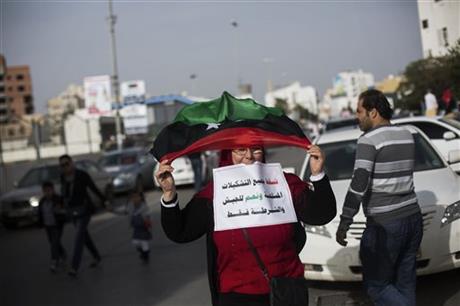
By ESAM MOHAMED
A Libyan woman waves a Libyan flag to support the new national army
and the police corps during a protest in Tripoli, Libya, Friday, Nov. 22, 2013. Thousands of protesters have gathered in Libya’s capital to call on unlawful armed groups to leave the city, a week after militiamen killed more than 40 people. The head of Tripoli’s local council, Al-Sadat al-Badri, told the crowd on Friday that the city will remain on strike until the capital and its surroundings are free of militias. The Arabic reads, “Down all the armed group. Yes to the army and the police only.” (AP Photo/Manu Brabo)
TRIPOLI, Libya (AP) — Clashes pitting soldiers and armed civilians against members of a militant Islamic group in Libya’s eastern city of Benghazi left nine dead early on Monday, officials said.
It was the latest confrontation between residents of Libya’s larger cities and the militias based in their midst. The country’s interim prime minister rushed to the city in an apparent effort to defuse the crisis.
The fighting started before dawn between armed citizens and members of Ansar al-Shariah, a hard-line group suspected to have been behind the Sept. 11, 2012, attack on the U.S. consulate in the eastern city, which left the U.S. Ambassador dead along with three other Americans.
Despite being officially banned, the Ansar al-Shariah continues to maintain a presence in Benghazi.
The army’s special forces stepped in on the residents’ side to quell the violence, said security officials. They spoke on condition of anonymity in line with regulations. A statement from the deputy prime minister and interior minister said nine were killed and 43 wounded.
The city’s al-Jalaa hospital received the bodies of four soldiers and one civilian, according to the hospital spokeswoman, Fadya al-Barghathi. It was unclear who the other dead were.
Later Monday, the country’s interim Prime Minister Ali Zidan arrived in Benghazi from Tripoli, officials said. Zidan has declared that he is working on a security plan to rein in the myriads of armed militias that have challenged the central government.
Sounds of explosions and gunfire echoed across much of the city, but mainly in the Raas Obeida district and surrounding areas, witnesses said. Clouds of black smoke hung over Benghazi as ambulances rushed the wounded to hospital and pickup trucks with anti-aircraft guns mounted on their backs fired as they dashed from one street to another.
Classes were suspended at the city’s schools and local university, and most Benghazi residents stayed home because of the fighting. Mohammed Abu Sneina of Benghazi’s local council warned that harsh measures would be taken against anyone who disturbs peace and security.
A senior security official in Benghazi, Abdullah al-Saeeti, issued a call for off-duty soldiers to immediately report to their units. He said any armed convoys coming and going out of the city without permission would be bombed by the air force.
Libya has been roiled by unrest since the ouster in 2011 of longtime dictator Moammar Gadhafi. Armed groups that fought Gadhafi’s army turned themselves into militias that exploited the weakness of the weak central government in Tripoli and now control the streets, operating independently of the police and the military.
Earlier this month, at least 40 people were killed when residents of the capital, Tripoli, took to the streets to protest the presence of militias in the city. The uprising forced several militias to leave the city and head back to their hometowns.
The frustrations over the militias felt by many Libyans encouraged the government to start a major push to gain full control the vast, oil-rich North African nation.



